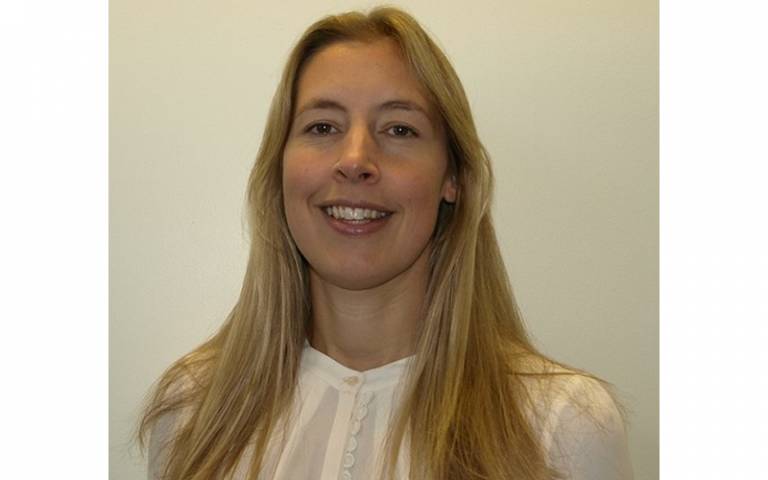Spotlight on... Nicola Walshe
7 April 2022
This week Professor Nicola Walshe, Executive Director of the new Centre for Climate Change and Sustainability Education, talks about the new Centre, her work supporting children's mental health and wellbeing, and the dangers of polar bears in the High Arctic.

What is your role and what does it involve?
I am Head of Department of Curriculum, Pedagogy and Assessment in IOE, UCL’s Faculty of Education and Society, a role which gives me oversight of the strategic and operational development of education, research and knowledge exchange across the Department and its research centres. I love the variety of the role, in particular working with colleagues from across the Department to bring together world-leading research, teaching and learning which reflects our expertise in and contributes to high quality education, teaching and teacher development.
I am also now Executive Director of the newly launched UCL Centre for Climate Change and Sustainability Education – a really exciting development within the IOE which aims to provide outstanding, research-informed professional development for teachers and school leaders across all phases, subjects and career stages.
How long have you been at UCL and what was your previous role?
I have only been at UCL since August 2021 but the extremely warm welcome from colleagues across and beyond the Department means that I already feel very much at home here. My previous role was Head of School of Education and Social Care at Anglia Ruskin University; working with social work colleagues taught me a lot about supporting mental health and wellbeing of children and young people within and beyond educational contexts, something which is now important in much of my research in schools.
What working achievement or initiative are you most proud of?
I am particularly proud of my recent AHRC-funded project, Eco-Capabilities, which explored how children’s wellbeing can be supported through working with artists in nature and outdoor places. Our initial findings demonstrate significant changes among the children who participate, including increased resilience in and out of the classroom, greater collaboration and empathy between children, and strengthened relationships between children and teachers, particularly for those who struggle in classroom environments. Further, after spending time outdoors, children developed a greater sense of belonging in and being part of nature, with enhanced recognition and appreciation of biodiversity and of nature as a space for calm and inspiration. As such, Eco-Capabilities has demonstrated the importance of providing time outdoors for all children, both for their mental health and wellbeing, but also for developing an understanding of the importance of environmental sustainability.
We have just been awarded additional funding for Branching Out, a project which aims to establish how successful elements from Eco-Capabilities can be expanded from school-based approaches reaching small numbers of children to whole communities. We aim to do this by adding capacity through engaging community-based volunteers in schools (Community Artscapers).
Tell us about a project you are working on now which is top of your to-do list
I am currently working on the development of the UCL Centre for Climate Change and Sustainability Education which is an absolute privilege. What is particularly ambitious about the Centre is that it will allow us to work across faculties at UCL to ensure that professional development we provide for teachers is not only informed by our own research into current practice in schools, but also by academic disciplinary research. This is crucial for teachers, a significant proportion of whom have been shown as feeling underprepared to teach issues of climate change and sustainability, unsure of where to access appropriate support, and concerned as to how to go about talking to young people without undermining their mental health and wellbeing. Our ultimate aim is to provide high-quality, research-informed professional development for all teachers and school leaders. This will ensure that as a society we are properly supporting our children and young people to develop the knowledge and values both to help them to understand the complexities and associated inequalities of climate change and sustainability, but also to adapt to a changing world and embrace the opportunities that more sustainable lifestyles might offer.
What is your favourite album, film and novel?
Albums: I enjoy a good compilation album and have quite an eclectic collection; one of my favourites is Take That!
Films: When I was a geography teacher, I frequently used The Day After Tomorrow to support students to critically examine representations of the science of climate change in the media, but secretly I do quite enjoy it. Terminator 2 is another of my guilty pleasures.
Novels: Half of a Yellow Sun by Chimamanda Ngozi Adichie, and Wuthering Heights by Emily Brontë.
What is your favourite joke (pre-watershed)?
Q: What did the sea say to the shore?
A: Nothing, it just waved!
Who would be your dream dinner guests?
Rosa Parks, Amelia Earhart, Malala Yousafzai and Marie Curie – all inspirational women who have been pioneers for women’s rights and racial equality. Perhaps also with Martin Johnson (I am a keen Leicester Tigers supporter!).
What advice would you give your younger self?
Don’t worry; every mistake you make leads to learning something and becoming stronger.
What would it surprise people to know about you?
My PhD is in glaciology and as part of that I undertook field work in Svalbard in the High Arctic. Because of the danger of polar bears I had to be trained to carry and fire a rifle, although of course polar bears are protected and shooting one would be absolutely a last resort. Spending time in Svalbard was such a privilege particularly as now, as a result of increasing temperatures through climate change, its landscapes are changing at an alarming rate (and I never did see a polar bear).
What is your favourite place?
Somewhere with mountains, always with my family.
 Close
Close

